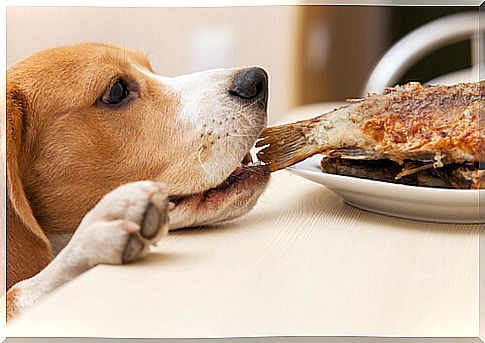Fish, Only Suitable For Cats Or Also For Dogs?

Whenever we relate an animal to a food, if it’s dogs, we think of meat, and if it’s cats, we think of fish. Well, this doesn’t have to be a rule. Surely if you offer the cat a piece of ham, he will gladly eat it.
Still, have you ever tried offering your dog some tuna or a piece of salmon? Any cat would go crazy, but if you haven’t tried a dog yet, who can assure you that they won’t appreciate it too?
Benefits of fish for dogs
Fish is a great source of protein and low in saturated fat, so it will help keep your pet’s weight under control.
In addition to this, it is an excellent source of Omega 3, which can have multiple benefits for your pet. Let’s see some of them.

The benefits of Omega 3 for dogs
Omega 3s are essential for our health, but they are not produced by the body of dogs, who therefore need to receive them from an external source. Fish is the best source of Omega3 in existence.
Dogs need Omega 3 for their joints, as this acts as a collagen and lubricant, which will allow your pet to have stronger and stronger joints. Also, it prevents arthritis. A dog with good and strong joints will not suffer from this disease.
It is also great for the coat and skin, as it keeps it hydrated, shiny and healthy.
As if that weren’t enough, Omega 3 strengthens your pet’s immune system, preventing your dog from sickness, ailments and infections.
So, yes, give your dog fish.
What fish to feed your dog?
While any type of fish can work, we recommend feeding your pet the one that contains the most Omega3. It is found mostly in oily fish. You must choose a fish that can be cleaned without leaving any remains or thorns that could injure your pet.
The most recommended are salmon and tuna.
Tuna: benefits
It is rich in lean protein, so it will help regulate your pet’s weight. It is rich in minerals such as selenium, potassium and magnesium, and in vitamins B3, B6 and B12. And, as we told you earlier, it is one of the fish that contains the highest amount of Omega 3. If you decide to give your dog canned tuna, it is better to choose the natural one, to avoid unnecessary fats contained in the oil. preserves.
Tuna: disadvantages
Tuna will not be part of your dog’s daily diet due to its high mercury content. The fresh one contains larger quantities, while the canned one has a high sodium content. Both are bad for your pet’s health.
You have to pay particular attention to the sodium levels. A high amount of this element can cause pancreatitis in your pet.
Salmon: benefits

Salmon is also a great source of Omega 3 and several minerals such as potassium, magnesium, zinc and vitamins A, B and D. Unlike tuna, it has little mercury, so you can give it to your pet whenever you want. . Canned or frozen salmon has lower levels of mercury than tuna and is the most advisable.
Salmon: disadvantages
Never give raw salmon to your pet, as it could poison it. Dogs are the only animals that can become intoxicated with salmon; This is because some salmon contain the bacterium Salmincola Nanphytus , which can react on contact with an organism called Neorickettsia helminthoeca, causing a fatal infection in your dog.
So if you decide to give your dog salmon, cook it at a minimum of 62 degrees to make sure it is safe for consumption.









